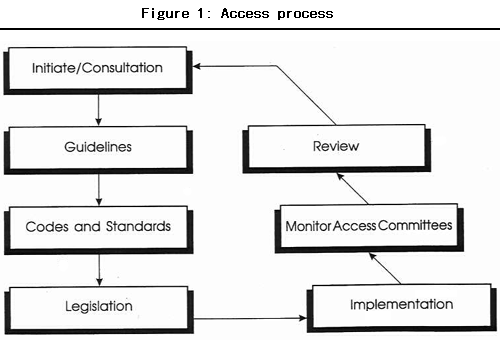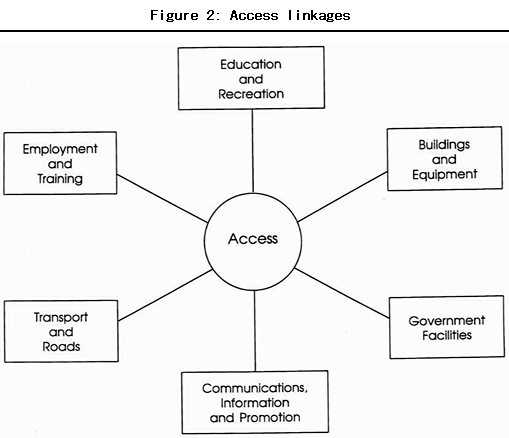Implementation of Access Legislation
Through the Establishment of Access Committees:
The Australian Approach (*2)
Access legislation has been adopted in very few countries in the ESCAP region. Even where it exists, access legislation is frequently not implemented. One possible solution to this would be the development of Access Committees at local, provincial or state and national government levels. These committees would operate in conjunction with local authorities, persons with disabilities, elderly people, and representatives of as many community groups as possible.
Access Committees have been successfully established in many parts of Australia over the past twenty years. The highlights of the Australia approach may provide a useful reference for other countries in the ESCAP region.
In Australia, mandatory building access legislation has been in force since 1981 and is continuously reviewed, amended and improved. During the Australian Bicentennial in 1988, the effectiveness of this legislation was reviewed. It was found that many local authorities were not clear about access requirements, and were not enforcing compliance.
Accordingly, a national access awareness campaign was launched to identify and give public recognition to excellent and/or innovative accessible programmes and environments. An awards procedure was set up. Eligibility was conditional on each local government authority establishing an Access Committee as a joint endeavour between the local council or authority, and the local community.
Of approximately 900 local government authorities in Australia, over 200 established Access Committees and submitted award applications during 1988. A considerable number of these committees remain active and some have formed regional linkages to identify and resolve a wide range of access issues.
The fundamental purpose of these Access Committees is to improve the quality of access legislation and implementation. This is a continuous process of testing and reviewing codes and standards. The Access Committees provide a critical review function due to their linkage between the elevant authority and the community. Figure 1 illustrates this access process.
Examples of these committees are the Mosman Council Community Access Committee and the Northern Region Access Forum. Mosman is an inner suburb of Sydney and the Forum has representatives from nine northern Sydney local government areas, including Mosman. The experience of these committees indicate that the following key issues should be included in Access Committee criteria and programmes:
- Membership should include government representatives who can actively pursue and implement change, and community representatives with disabilities, elderly people, activists and advocates.
- Committees need representatives from each major area of the local authority, including elected members, administration, building, planning, engineering and community services.
- Committees should liaise with adjacent local areas and other Access Committees to minimize duplication and to optimize cooperation in matters of mutual benefit.
- Major priorities should be identified and given realistic and achievable targets and time-frames.

Priority issues can be effectively addressed by sub-committees. For example, the Mosman Committee has four sub-committees, namely:
- Transport, including reviews of existing community transport, accessible subsidized taxis, parking concessions for drivers with disabilities and elderly drivers, and progressive implementation of more accessible public transport, spurred on by the prospect of significant improvement by the time of the Sydney 2000 Olympics and Paralympics.
- Access planning, consisting of continuous review of planning and building applications received by the relevant authority; setting up of access guidelines to complement existing or new legislation, seminars and workshops to familiarize local council officers with access and application requirements.
- Buildings and works, involving identification and removal of barriers to access in the local area, in relation to streets, crossings, parks, toilet facilities and parking space.
- Publicity and communications, to identify items and issues suitable for publicity and promotion of access awareness, and arrange collection and exchange of relevant information in accessible formats.
Access programmes have become very cost-effective through this process as residents, including people with disabilities and elderly people, are clearly identifying specific items and issues for rectification. One example is the continuous extension of accessible pedestrian networks with upgraded kerb ramps and audible controls for pedestrians at street crossings. These programmes are normally funded within existing annual works and maintenance budgets.
It is important that Access Committees are aware of the wider issues involved in the creation of more accessible environments. Figure 2 shows the essential links between accessible transport, buildings, equipment and communications that are required to provide equal opportunities for access to employment, education and recreation. The key issues that need to be addressed in the pursuit of more accessible environments and facilities include the following:
- Ongoing research and effective information exchange within and between countries to simplify and rationalize access material;
- The continuous evaluation and review of access standards, codes and legislation, to achieve quality implementation of this legislation; and
- The involvement of people with disabilities, elderly people, activists and advocates in all access issues, and close and continuous liaison with the Government.
- Education and training for local authority personnel, architects, engineers, planners and related professions and trades, to promote awareness and understanding of access issues and requirements, with regular updates.

_______________
*2 Based on a contribution by Michael Fox, Director, Access Australia Consultants Pty Ltd., to the Expert Group Meeting on thePromotion of Non-handicapping Environments, Bangkok, 6-10 June 1994.
Go back to the Contents
ECONOMIC AND SOCIAL COMMISSION FOR ASIA AND THE PACIFIC
Promotion of Non-Handicapping Physical Environments for Disabled Persons: Guidelines
- ANNEX 5 -
UNITED NATIONS
New York, 1995
